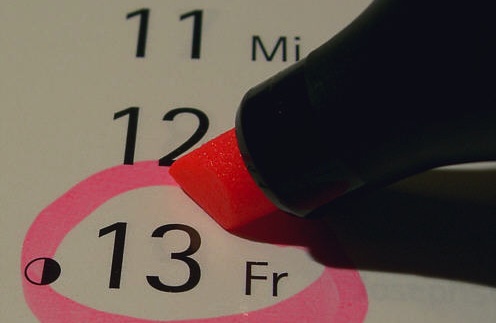PARIS — It’s unlucky to stay inside on the 13th day of the Iranian new year, but fear surrounding the number 13 has chilled people for centuries around the world. The fear of the number even has its own psychological term coined in 1910: “Triskaidekaphobia.”
Videos By Rare
From Friday the 13th, the Apollo 13 mission and even Judas’ 13th seat at The Last Supper, here’s a look at the power of the number 13 in history and popular culture:
The Last Supper’s unlucky 13th seat:
In Western lore, experts believe the fear over 13 started in the Bible.
Some believe that at the Last Supper, Judas, the disciple who betrayed Jesus, was the 13th to sit at the table — though the Christian text does not specify an order in which they gathered.
“It was first thought to be unlucky to seat 13 at a table because of the Bible story but after it developed that 13 was unlucky for anything,” says Stuart Vyse, the author of “Believing in Magic: the Psychology of Superstition.”
Vyse says that fears were consolidated in Norse mythology in the late 8th to the mid-11th centuries.
The evil Loki, played by Tom Hiddleston in Marvel’s “Thor” movies, was according to Viking myth the 13th god in their pantheon. Also, death is the 13th card in a tarot deck.
Is it Friday or Tuesday the 13th?
The myth of the cursed Friday the 13th as immortalized in the cult slasher movie is a relatively new thing.
It’s thought that already existing superstitions with the number’s bad luck was merged with the bad association with Friday, the day people were traditionally hanged in Europe. For Christians, Friday is also the day Jesus was crucified.
Friday still chills in the West, though ironically enough, a study once claimed that in fact the number of car crashes went down, not up, on Friday the 13th as people stayed at home out of fear. In Greece, Mexico and Spain, it’s Tuesday the 13th that’s thought to be cursed.
Apollo 13:
The Apollo 13 lunar mission, subject of 1995’s acclaimed Tom Hanks film, was aborted after an oxygen tank exploded.
Before the event, NASA and the crew’s commander Jim Lovell brushed off the idea that Apollo 13 was a cursed mission over superstitions.
But numerologists had a field day over the mission’s launch date that when written out — 4-11-70 — the individual digits add up to 13. It was also on April 13 that the tank exploded.
Air France doesn’t have a 13th row:
Airlines such as Air France often have a 12th and 14th — but no 13th row. Many buildings in the U.S. don’t have a 13th floor, and some airports are constructed without a gate 13.
Experts say that it’s an economic decision — as customers would not spend money on something they thought was cursed. According to a Gallup poll that appeared in 2007 — spookily enough — 13 percent of Americans said they would be bothered if they were placed on the 13th floor.
It’s 4 that’s unlucky in China:
In Asia, 13 is just another number. And in China, it’s the number 4 that provokes the most fear.
The phenomenon, known technically as “tetraphobia,” exists because of linguistic reasons.
“In Chinese the number 4 sounds much like the word for ‘death,'” says Patrick Alexander, a social anthropology lecturer at Oxford University. “As a result, the number 4 is often omitted in elevators and other public contexts.”
The number 8 is particularly lucky in China and Japan because it sounds similar to “prosperity” or “wealth.”
Follow Thomas Adamson on Twitter at www.twitter.com/ThomasAdamsonAP.
Copyright The Associated Press

